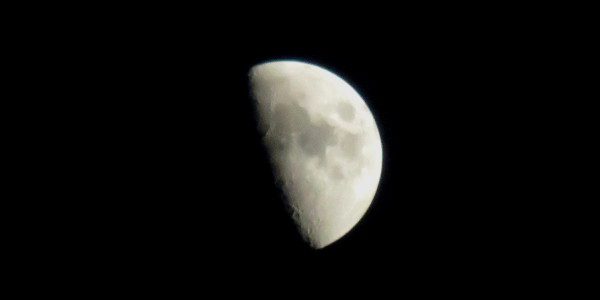Writing A Commitment to Truth turned out to be a very introspective exercise. As I worked through the seven major sections – and especially the first three – I realized these are things I’ve always believed. Nobody taught me that facts are sacred, that I should follow where the facts lead, and that truth is built on facts. The church taught “thou shalt not lie” and school taught the scientific method, but that just formalized what I already knew in my heart was true.
I grew up in a fundamentalist Baptist church. That kind of religion didn’t work for me for reasons I’ve already written about at length. When I left I should have joined the rest of my extended family as a Methodist (I tried), or I should have abandoned religion entirely and become an atheist. Instead, I became a Pagan.
This is a rather personal story, but I think it’s a story worth sharing.
It began with curiosity. If you strip away all my roles, all my masks, all my thoughts and feelings, all the things that make me who I am, what you will find at the core is curiosity. I want to know! Science and religion, art and history, sports and entertainment, people and relationships – you name it, I want to know it. I can never remember a time when I wasn’t trying to find out how the world and everything in it works.
Yes, knowledge is power, and knowing things has always been helpful. But my curiosity isn’t a utilitarian thing, it’s an end unto itself. I want to know for the sheer joy of knowing.
Authorities can be wrong – and often are. I was one of those little kids who was constantly asking questions. But I wouldn’t just ask a question once – I’d ask it several times, to several people. I quickly noticed something: different people gave different answers. And sometimes, the same people would give different answers at different times. This perplexed me – all these different answers couldn’t be right. I figured out that some questions were matters of opinion or preference rather than fact, but others needed definitive answers.
My father believed children should not question their parents. He snapped at me a couple of times (which he did not do often) when I challenged him or my mother about a factual matter. I genuinely didn’t understand his anger – I wasn’t being a smartass, I just wanted the right answer. It would be years before I would understand that many people can’t or won’t separate the issue of truth from the issue of authority.
If authorities could be wrong, the only way I could know for sure was to see for myself. To this day, I still occasionally offend people (sometimes people very close to me) when I insist on verifying their answers. It’s not that I don’t trust your competence or your integrity, it’s that I need to see it for myself.
Being right is more important than avoiding change. It would bother me when I would “learn” something that wasn’t true, repeat it, then find out I was wrong. I’ll be honest – sometimes I tried to spin the mistake away. But more frequently – and always internally – I simply incorporated the new information into my thinking, and I tried to learn where I went wrong in the first place so I wouldn’t make that mistake again.
In recent years I’ve learned that when confronted with evidence that contradicts their opinion, most people will deny it or rationalize it away. It’s a challenge to their worldview and to their identity, and they don’t want to change. But I’m still that curious little boy who desperately wants to know – failing to accept new evidence is what goes against my core identity.
The Bible is not a reliable authority. I was taught that the Bible is the literal and inerrant Word of God. But the older I got, the more I realized that the Bible was wrong about the age of the Earth, the development of life, the Garden of Eden, Noah’s flood, and many other matters of scientific and historical fact.
Without a factual foundation, with the problem of theodicy, and with the complication of many world religions, the fundamentalist religion of my childhood crumbled.
I sometimes wonder if I would have felt the need to leave Christianity if I had grown up in a liberal, mystical, Anglo-Catholic church. Perhaps not, although the Forest God might have had something to say about it. But that was never an option in my life, so it will always remain speculation.
To my Christian friends: there is still wisdom and meaning in the stories of the Bible. The teachings of Jesus are a wonderful way to live your life. And as a polytheist, I have no problem acknowledging Jesus as a God – just not as the only God. If your Christianity is a positive force in your life, I’m happy for you and I have no desire to convert you. But the Christianity of my childhood was and is a false and harmful religion and I had to leave it.
There are few “deep facts” in matters of religion and spirituality. I cannot prove the existence of Gods, spirits, magic, an Otherworld, or even the human soul. There is plenty of evidence for these things – facts that point to their existence – but no facts on the order of the existence of planets, protons, and cats.
To my atheist and agnostic friends: if this lack of proof leads you to conclude these things don’t exist, or to spend little time and energy on them, I respect your decision. Who knows – you might be more right than I am.
But I couldn’t stop here.
There is much we do not know. It is the conceit of every generation to believe – or at least, to act like – they are finally in possession of the full and complete truth. Many contemporary Pagans look with dismay at the colonialist attitudes of the Victorians, and at the 18th and 19th century Druids who tried to make their ancient namesakes into the forerunners of Christ and proper Anglican Christianity. What are we sure we know that future generations will look back on with amazement at our ignorance and arrogance?
Absence of evidence is not evidence of absence. Keep an open mind and follow the facts where they lead, even if they lead to places many people believe can’t exist.
This we know: religion, spirituality, and magic work. Humans are notoriously utilitarian creatures. If something works, we’ll keep doing it. If it doesn’t work, we’ll abandon it for something else. There is evidence for religion, spirituality, and magic going back to burials with grave goods by Neanderthals and Homo sapiens over 100,000 years ago. There is evidence in the temples that pre-date civilization. There is evidence in the stories tribal peoples have passed down for tens of thousands of years (if you haven’t read Star.Ships yet, I strongly encourage it).
When you pray, mediate, or study myths; when you attend a Wiccan circle or a Catholic mass or a UU Sunday service; when you solemnize a wedding or a funeral, you’re following a tradition that’s as old as humanity.
We have differing opinions on what religion, spirituality, and magic actually do when they work. We know they create meaning and identity. We know they form and strengthen relationships. We know they provide inspiration and comfort. And we know many religions accomplish this, not just one. These are facts – facts we can build on.
I don’t have to know how something works in order to use it. I’m fortunate to live in an era where new technology arises all the time. I’ve never, ever looked at new technology and said “I don’t know how this works, so I can’t use it.” Rather, I’ve said “that looks cool, let me play with it.”
Is magic psychological? Does it work by the intercession of spirits? Is there such a thing as psychic energy and are humans capable of manipulating it? I think the answer is all of the above, but ultimately, I don’t know.
I just know I get results when I use it.
Experiences are facts. Last summer I saw a green glowing bird. It was something that should not exist, but there it was. I went through all the “rational explanations” and I came up with nothing. There can be honest disagreement as to what I actually saw, but my experience is a fact on the order of planets, protons, and cats.
I have had intimate, ecstatic, personal experiences that I believe are experiences of Gods. They included thoughts that are not mine, words that are not mine, and knowing things I had no way of knowing. Others who were with me believed they were hearing from a God. That I experienced the presence of a God is an interpretation, not a fact. But that I had an intimate, ecstatic, personal experience is a fact.
When I first meditated on the nine Gods of the Egyptian Ennead, my experience of Isis was different from my experience of Osiris, which in turn was different from my experience of Tefnut. That led me to believe that the many Gods are individuals, not aspects of one God.
We can disagree as to exactly what it was that I experienced, but that I had these experiences is a fact.
The facts of many religious experiences build toward religious truth. I see truth as the reliable conclusion of a series of facts. So consider these facts:
- The fundamentalist religion of my childhood is false.
- There is much about the universe we do not know – there are possibilities we aren’t even considering.
- Religion, magic, and spirituality have been helpful to humans for at least 100,000 years.
- I have had experiences that align with what others have long described as Gods and spirits.
- I have interpreted these experiences in a Pagan, polytheist, and animist context.
- The practices and the relationships I have built on these experiences and interpretations have been deeply meaningful. They continuously help me navigate through a challenging world and deal with the Big Questions of Life.
- I have encountered nothing that leads me to believe my interpretations are false. Might another equally curious, equally reasonable person come to a different conclusion? Certainly. Might that person be right, or at least more right than me? Absolutely. But I’ve seen nothing that compares to the evidence against the fundamentalism of my childhood – there is nothing that says “this canNOT be true.”
This works for me. These facts and many others have led me to a religion I describe as ancestral, devotional, ecstatic, oracular, magical, public polytheism. It is both a way of living and a model of how the world works, a model that is imperfect but useful. It is under continuous review and refinement: being right is more important than avoiding change.
Your model may be different from mine. If it is meaningful and helpful to you – and if it is respectful of others – I have no desire for you to change. Different religions cannot be equally true, but they can be equally helpful. Ultimately, we have no way of knowing which religion is closest to “right.”
Facts are sacred. Follow the facts where ever they lead. Truth is built on facts. Your journey may lead you elsewhere. My commitment to facts and truth led me to Paganism.





















